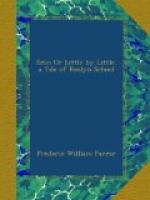From the beginning, Mr. Rose took a deep interest in him. Few could look at the boy’s bright blue eyes and noble face without doing so, and the more when they knew that his father and mother were thousands of miles away, leaving him alone in the midst of so many dangers. Often the master asked him, and Russell, and Owen, and Montagu, to supper with him in the library, which gave them the privilege of sitting up later than usual, and enjoying a more quiet and pleasant evening than was possible in the noisy rooms. Boys and master were soon quite at home with each other, and in this way Mr. Rose had an opportunity of instilling many a useful warning without the formality of regular discipline or stereotyped instruction.
Eric found the life of the “boarders’ room” far rougher than he had expected. Work was out of the question there, except during the hours of preparation, and the long dark winter evenings were often dull enough. Sometimes, indeed, they would all join in some regular indoor boys’ game like “baste the bear,” or “high-cockolorum;” or they would have amusing “ghost-hunts,” as they called them, after some dressed-up boy among the dark corridors and staircases. This was good enough fun, but at other times they got tired of games, and could not get them up, and then numbers of boys felt the idle time hang heavy on their hands. When this was the case, some of the worse sort, as might have been expected, would fill up their leisure with bullying or mischief.
For some time they had a form of diversion which disgusted and annoyed Eric exceedingly. On each of the long iron-bound deal tables were placed two or three tallow candles in tin candlesticks, and this was the only light the boys had. Of course, these candles often, wanted snuffing, and as snuffers were sure to be thrown about and broken as soon as they were brought into the room, the only resource was to snuff them with the fingers, at which all the boys became great adepts from necessity. One evening Barker, having snuffed the candle, suddenly and slyly put the smouldering wick unnoticed on the head of a little quiet inoffensive fellow named Wright, who happened to be sitting next to him. It went on smouldering for some time without Wright’s perceiving it, and at last Barker, highly delighted, exclaimed—
“I see a chimney,” and laughed.
Four or five boys looked up, and very soon every one in the room had noticed the trick except little Wright himself, who unconsciously wrote on at the letter he was sending home.
Eric did not like this; but not wishing to come across Barker again, said nothing, and affected not to have observed. But Russell said quietly, “There’s something on your head, Wright,” and the little boy putting up his hand, hastily brushed off the horrid wick.
“What a shame!” he said, as it fell on his letter, and made a smudge.
“Who told you to interfere?” said Barker, turning fiercely to Russell. Russell, as usual, took not the slightest notice of him, and Barker, after a little more bluster, repeated the trick on another boy. This time Russell thought that every one might be on the look out for himself, and so went on with his work. But when Barker again chanted maliciously—




